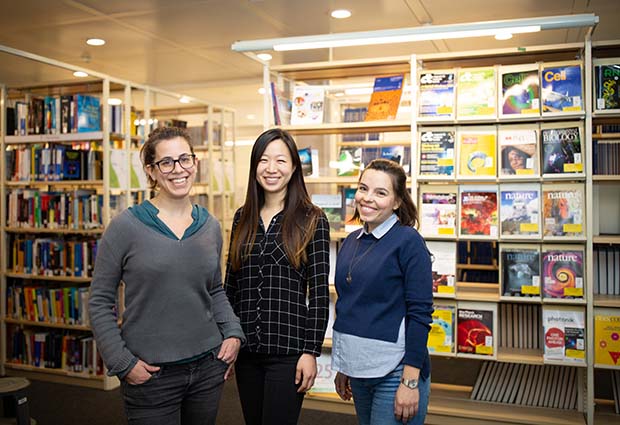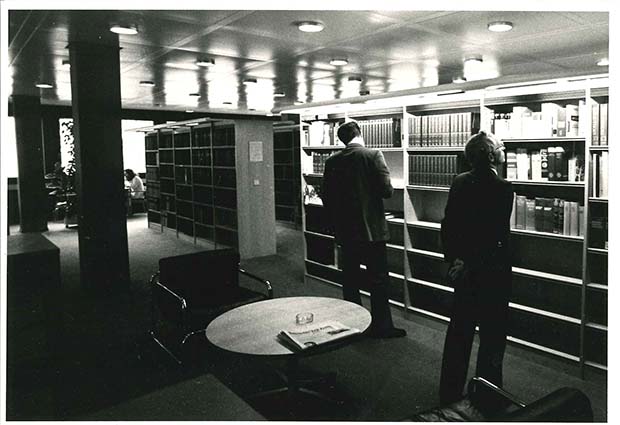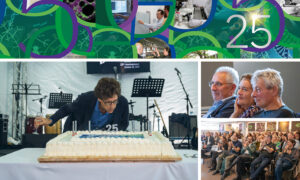
Marking 40 years of the Szilárd Library
A long way from two cupboards and a pencil

John Kendrew, EMBL’s first Director General, was determined from the outset that EMBL would have a library. He recruited Mary Holmes – a former colleague from his time in Cambridge – to get things up and running, assuring her that what he had in mind was something old fashioned. He didn’t want one of those new-fangled computerised libraries.

From the first pencil
Holmes was invited back to EMBL in 2016 for the reopening of the library following renovation, and she recalled how she built up the library “from the first pencil”. She subscribed to 30 journals and was given two cupboards in which to store them. Every day, she would type a list of the latest deliveries and pin it to the door. Scientists waited eagerly to get their hands on print copies of Nature and other journals.
“As the collection grew, the library moved and expanded from one small room, to two, then three,” Holmes recollected.
The internet effect
Fast forward four decades, and the shift to digital has seen a shrinking of the space occupied by the library. And that’s not the only change. The routine work of today’s librarians bears little resemblance to that of Mary Holmes. There’s not a date stamp or borrowing card in sight.
These days, scientists and other library users access journals and other resources online, sometimes unaware that they’re even using the library. But this ease of access belies the dedicated behind-the-scenes efforts of the librarians in managing journal subscriptions and keeping up to date with the latest developments in the rapidly changing field of academic publishing – and helping to shape the future of this field.
That’s not to say that the library space has become redundant. On the contrary, it offers people a respite from the lab bench – a quiet place for concentration and contemplation. “They’re not coming here to access the resources – they can do that from anywhere,” says senior librarian Ioanna Ydraiou. “They come here to find sanctuary.”

Now we’re moving more into the open access and open science domains
An open mindset
Ydraiou has witnessed many changes in libraries and librarianship during her career, which includes almost nine years of service in the Szilárd Library. “The internet and the loss of library space came hand in hand,” she reflects. “In fact, many people believed that the internet would completely replace libraries. Instead, it became one more tool that libraries use to deliver their services and disseminate information. Now things are changing again, and we’re moving more into the open access and open science domains.”
Open science is the broad movement towards making all aspects of scientific research – including peer review, data and methods – transparent and freely accessible to all. Open access – a mechanism by which published research is made available free of charge to the reader, and free to use, under an open licence – is just one component of this bigger picture.
Ydraiou’s former boss Tobias Sack helped to develop EMBL’s first internal policy on open access. This policy underscored EMBL’s commitment to providing open access to outputs of publicly funded research, and ensuring compliance with the open access requirements of its funders. “This policy, along with international developments in open access, resulted in a lot of change for the library,” she says.
A good DEAL
EMBL supports open access, as do many of our funders. We’re also part of the German DEAL consortium, which means that members of the EMBL research community now have access to Wiley’s entire eJournal portfolio of more than 1600 journals. For no additional cost, EMBL researchers can also publish articles as open access in Wiley’s hybrid journals – these are subscription-based journals that offer an open access option on individual articles, subject to payment of an article processing charge (APC). EMBL authors also receive a 20% discount on APCs when they publish in fully open access – or Gold Open Access – journals. The deal includes the journals published by EMBO Press.
We’re trying to see how EMBL can best position itself within this constantly changing environment, how EMBL can be a leader in open science
“We spend a lot of our time now thinking about open access and open science,” says Ydraiou. “We support the annual Open Access Week, organising talks and events at EMBL to promote and raise awareness of open access. We’re trying to see how EMBL can best position itself within this constantly changing environment, how EMBL can be a leader in open science, and how we can change our policies to best help the community to do open science.”

Shaping the future
Ydraiou is keen to see the role of librarians continue to evolve in step with developments in academic publishing. “I’d like to see librarians spending less time working on subscriptions, and instead becoming more involved in the procedure of scholarly publication – advising the community on how to do things properly, how to take care of their data, how to publish open access,” she says. She is undaunted by the challenges ahead: “This is a good time to be a librarian. You have an opportunity to participate in all these changes – to shape the future.”


